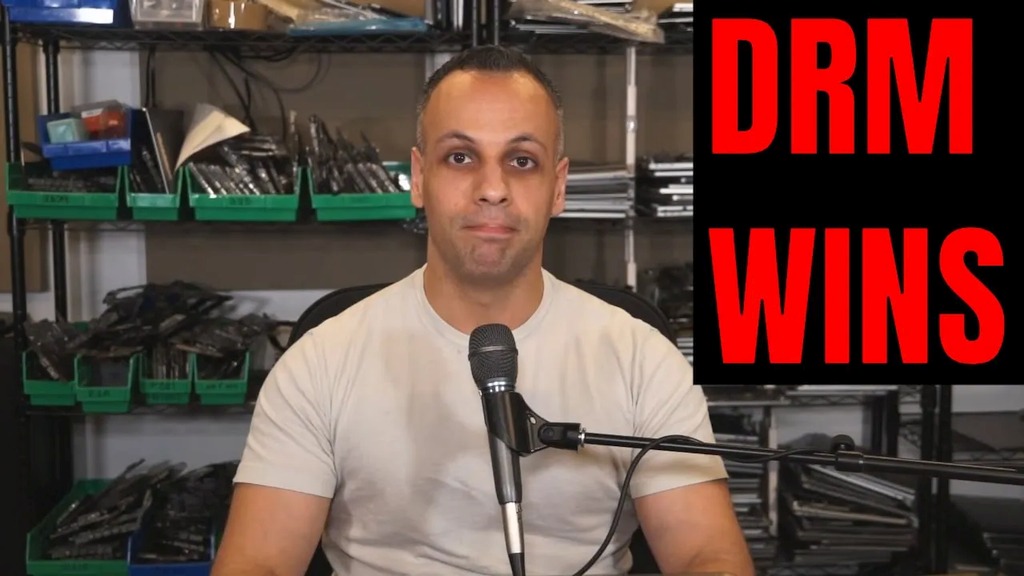How many of your devices have you activated over the Internet today?
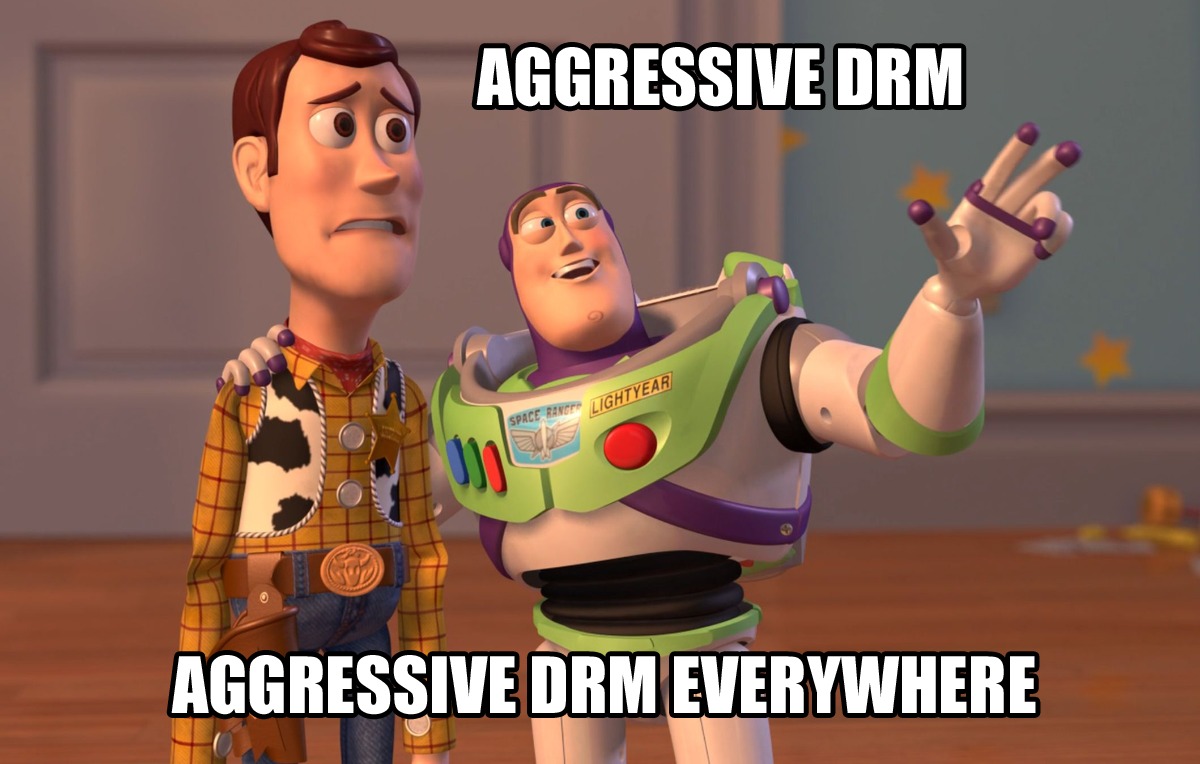
Most people don't like change. But following the proverbial "slowly boiling frog" principle (which is factually incorrect, by the way), if you change your business practices slowly enough and promote them in the media as a positive thing, those changes will eventually be accepted as the new widespread standard. And the waterfall of complaints and negative press will gradually subside, leaving you with an amorphous mass of consumers willing to give up their freedoms and personal data in exchange for electronic services and even physical goods.
Because… What is the "norm"? It's a constantly changing concept in itself. For all intents and purposes, I think it's enough to consider something "normal" if it's practiced or believed in by a large enough portion of the population.
Some of us may not consider the anti-consumer practices mentioned in this post to be the "norm," but given enough time, they will become the norm. Some might even suggest that maybe, just maybe, you don't have to blindly obey and do what the companies and corporations expect you to do, and instead protect your privacy and ensure the security of your future by choosing consumer-friendly companies over those that keep getting away with more and more egregious ways to take those freedoms away from you and turn your personal life into a profitable business asset. Except that those views are becoming less popular by the day.
Now what the hell am I rambling about?
Simple:
DRM Has Won
No, seriously. And I can prove it.
DRM, or "Digital Rights Management", an approach absolutely adored by corporations and (mostly) loathed by consumers, can almost be considered a cruel meme at this point. Today, DRM is a collective term, an embodiment of everything related to how corporations and digital rights/patent holders assert their control over how and where their products and IPs are used. By its very nature, DRM is an intrusive concept, and the way it's being forced into our lives is anything but gentle.
For a while, DRM had a hard time finding its way into all sorts of goods and services, but it seems that goal has all but been achieved, even when it comes to physical goods available on the market today.
Want proof? Let's look at just a few notable examples so as not to waste too much of your time and get right to the point.
The Xbox DRM Development
It all started with the familiar and oh so common requirement for the buyer to "activate" the device they purchased. It makes… some sense in a way that if a player wanted to play online, the company would need to have means to identify the user as well as grant access to its electronic e-shop, store payment information and such.
Originally though, Xbox users had a choice in the matter. They could create an offline account immediately upon purchase and pop in a compact disk with a video game and start playing right away, no questions asked. Or, if they wished to, they could connect the console to the Internet and create an Xbox Live account to play with their friends or get access to downloads.
They had a choice.
This practice has changed quite a bit since then and the changes began with Xbox One, released in 2014:
Note You must be online when you set up Xbox One for the first time. Without an Internet connection, you can’t finish setup. After your Xbox has updated and you’ve added your profile, you can go offline.
Ouch.
Pretty blunt, heh? "You can’t finish setup. Period". You don't get to choose not to register online, you can either accept or refuse the terms provided. And if you go with the latter option, you'll have to return the console to the retailer hoping they agree to take it back.
Believe it or not, it could have been worse if not for the backlash that occurred in 2013. You see, originally Microsoft wanted Xbox One owners to check in to the Internet every 24 hours to play their games. Yes, the dreaded "always online" approach, except it was actually marketed as something beneficial to the customers.
It didn't fly though, so the company bit the bullet and promised not to impose such a strict requirement:
An internet connection will not be required to play offline Xbox One games – After a one-time system set-up with a new Xbox One, you can play any disc based game without ever connecting online again. There is no 24 hour connection requirement and you can take your Xbox One anywhere you want and play your games, just like on Xbox 360.
The problem is… This part of the statement:
…you can play any disc based game without ever connecting online again
…didn't age very well. The latest console in the lineup called Xbox One X requires players to connect to the Internet even if they install a game off a physical disk:
With a big pile of physical Xbox One games sitting here, I disconnected myself console from the Internet. At this point, my Xbox Series X wasn’t set as my home console. Chucking Okami HD into the disc drive, I installed the game and tried to boot it. I was greeted by a lovely error message saying I needed to complete the installation. I jumped online, booted the game, cancelled out the patches, switch back to offline and tried again. This time, it worked.
Going back online, I set my Xbox Series X as my home console and went back offline. This time, I tried installing Lego Marvel Super Heroes. After completing the game disc installation, I tried booting the game and was once again met with the fantastic error message you can see in the feature image of this article.
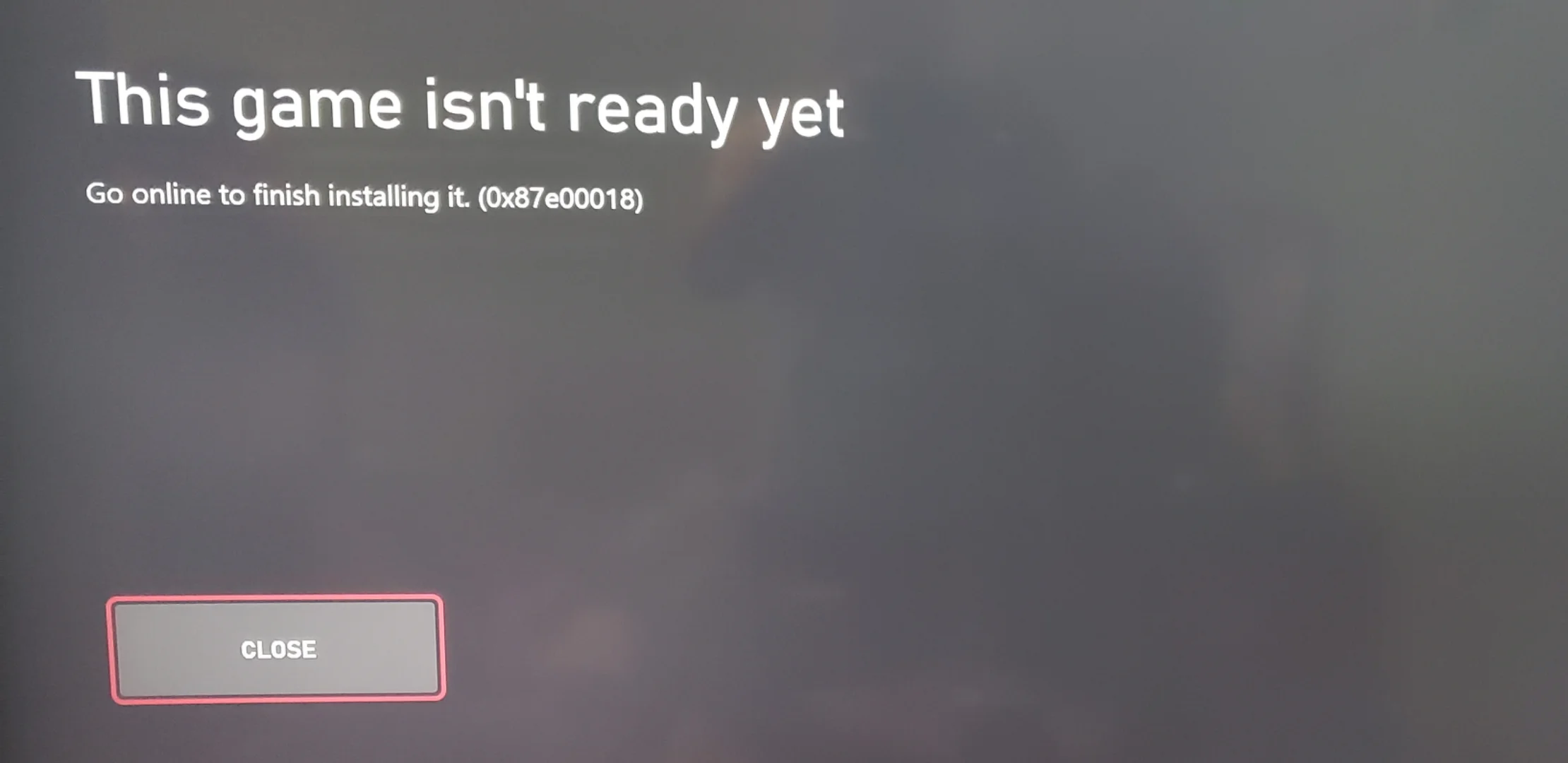
And once again — OUCH!
That's not a very nice way to ask someone to connect to the Internet to verify something. The companies are getting more and more aggressive with their demands because they are getting cocky. But then... there's not much pushback from the customers, so why shouldn't they?
And when asked whether this is something to be expected Microsoft responded thusly:
To ensure players’ backwards compatible catalog of games play best on Xbox Series X|S, the system connects to Xbox Live to download any patches or configuration settings during installation from a physical disc. Once the game has been successfully installed and updated, gamers will be able to play offline with the disc inserted if the title allows offline play.
This pathetic boilerplate response is missing a very important part. Let me fix it for you, Microsoft:
... We also decided not to give the players the choice to opt out of having to connect to Xbox Live servers and just play the game they purchased because screw you that's why. Deal with it.
There. Nothing short of poetry.
So not only do you have to activate the console itself, now there's no way to install and play a physical game you own if you're offline, each installation will need to be verified by Microsoft.
This "development" of the Xbox DRM approach quietly happened on the sidelines, so as not to attract too much attention and to one day become a nasty surprise for a new owner who unknowingly purchased a console which, for all intents and purposes, is tied to Microsoft servers even more than its predecessors.
I swear, the next Xbox console will probably actually revert back to their original "connect to the Internet at least once every 24-hours" online DRM idea.
And people will just accept it. You can quote me on that.
PS4 Clock Battery and Errors CE-34878-0 and CE-30391-6
Time to pull out skeletons from the past, because some forms of DRM only expose themselves years after they'd been quietly implemented in the product.
In March 2021 Tom's Hardware reported:
Your PS4’s ability to play disc-based and digital games could come to an abrupt end if the internal clock battery dies on you. The bad news comes courtesy of trusted modder, Lance McDonald, who has offered some worrying insight into what happens when the battery dies. He found that users could be left with a bricked console, unable to play physical or digital-based games. […]
The PS4's broken batteries involve an error code that was highlighted earlier this month by Twitter account, Does it Play?. The Twitter profile refers to the PS4’s Error, CE 34878-0, which signals when your console’s internal clock battery goes kaput.
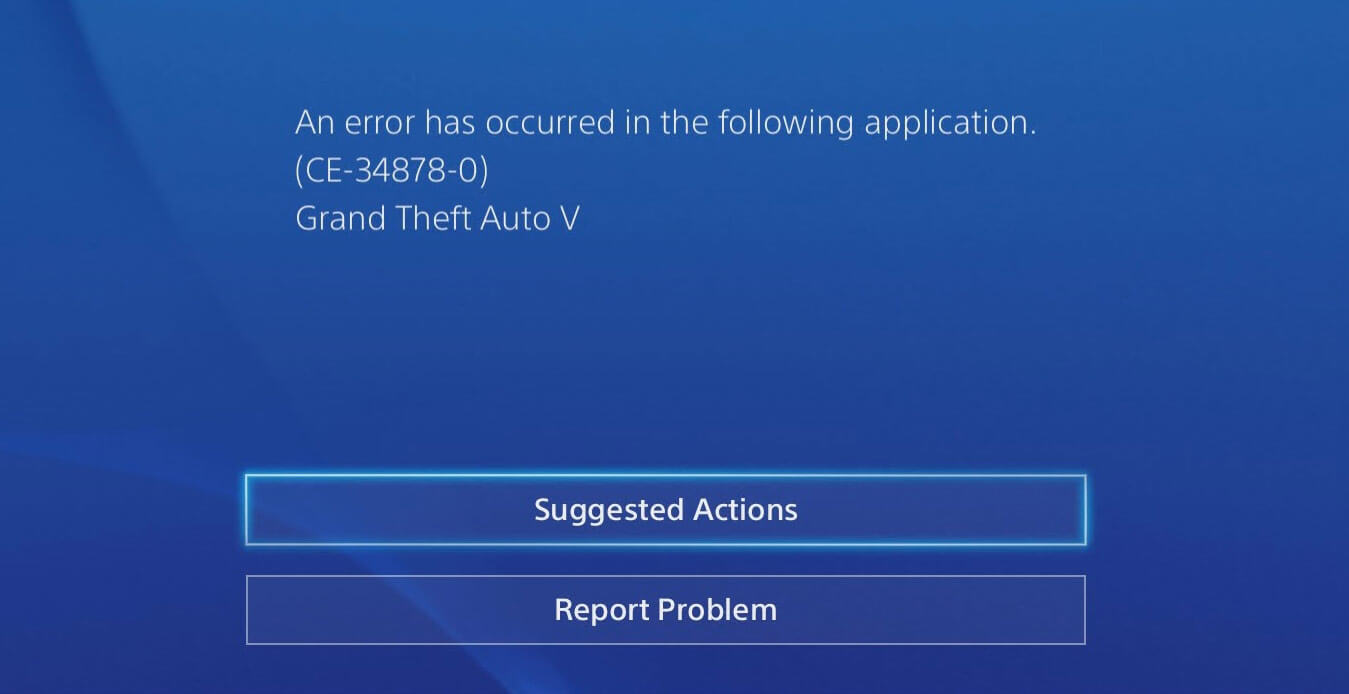
And here's the original tweet by Lance McDonald:
This error is as a result of Trophies on PS4 require the inner system clock (the one you’ll be able to’t see / alter) to be appropriate, so individuals cant change their PS4 date/time to make it appear to be they bought trophies sooner than they actually did. If your PS4 clock battery dies, all of your video games die
But what's this "CE 34878-0" error exactly (also known as "CE-30391-6")? Well, like most computers, PS4 has a cell battery in it to keep track of time. If you remove or replace one, it will not only reset the clock, it will do something much more interesting than that. It will reset the internal, hidden clock of the PS4, also known as "kernel clock", which is used as a part of DRM system to verify licenses and some features like trophies. The problem is — there's no way to set the kernel clock apart from connecting to Sony Playstation servers. But what makes it a deal-breaker is the fact that until this clock has been re-set, no games can be played on the console. Yes, including the ones you have in your physical Blu-ray collection.
A way to fix this in case Sony servers become unavailable or eventually get shut down comes from (surprise-surprise!) the hacking community. Specifically the Jailbreak developers who from time to time figure out exploits which give complete access to the operating system of the device. One of those exploits allows to run a payload that can (in theory) help change the kernel clock or disable the checks.
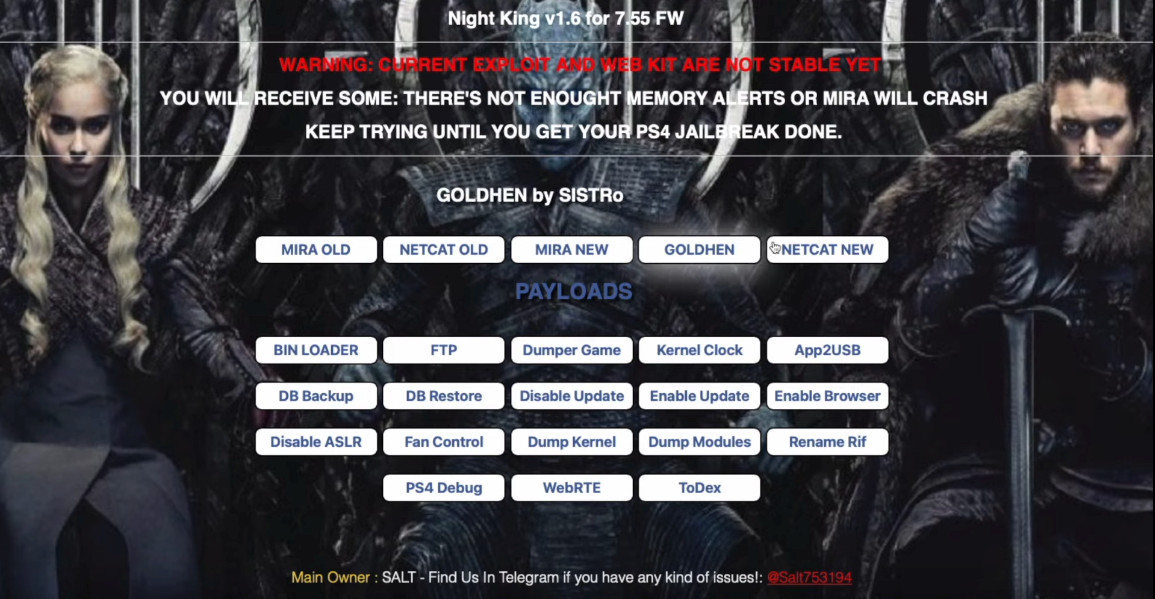
Unfortunately, at the time that's still a temporary fix which will only allow running decrypted games downloaded from the Internet and not via the Playstation e-shop or from a physical disk. But at least it will allow one to actually use the console to play games.
The jailbreak is also only available for certain versions of the PS4 firmware so if, say, firmwares v10.0 and up never get jailbroken, Sony better still be up and kicking when you take your PS4 out of storage in 10-odd years and decide to play a game or two.
Some readers might not consider this an issue by assuming that most PS4 Titles would probably become playable on the successor model – PS5, and then PS6 and so on, as well as ultimately get re-released and remade. So there's no real reason to cling to the past and hold on to (soon to be) "inferior" or "obsolete" games.
Except...
This particular discovery has nothing to do with the topic of "game preservation" or video games in general. It's all about the precedent: implementing "time-bombs" in one form of the other in new devices is becoming something of a standard practice nowadays among all sorts of companies. And unfortunately some of such issues only get discovered very late into the life cycle of the product.
Now that is the real problem, no matter how you look at it.
Activate Your Mug, Please
Imagine if you purchased a self-heating mug and it required you to create an account to use it.
That's exactly what happened in one of Techmoan's reviews, where he decided to test a temperature-controlled mug that connects to the phone via Bluetooth.
Could they have made it so you wouldn't have to register your mug and could just download and use the app? Sure! But why give up "free" data collection if the buyers approve? Hell, this 110 USD mug has 1700 ratings on Amazon alone. And a 4-star rating? Talk about universal appraisal!

Even though this is not strictly speaking "DRM", the fact that you need to create an account for a mug means you won't be able to use the product you paid 110 bucks for, unless you agree to give up some of your personal data and have your use of the mug and the app logged at all times by the developers.
This obnoxious anti-consumer practice is becoming more and more acceptable for some unfathomable reason. It's so sad.
Anti-Repair Practices
DRM is not always about new devices or services. It also affects how products can (or can't be) repaired. I'll allow Louis Rossmann explain what anti-repair practices look like. In his recent video Louis covers his Right to Repair initiative where he hopes to make it mandatory for the manufacturers to make parts and schematics for the devices available for 3rd-party repair centers, as well as make sure the products are more future-proof in general or repairable at all.
The initiative will probably fail, because the whole premise of "repair" is universally bad for large businesses in a capitalist society. So it will most likely get gradually pushed back by the corporations and their lobbyists, and will eventually quietly die in the corner. But it's commendable that he decided to go along with this idea and is doing it in good faith.
UPDATE as of 29.12.2022: as I expected, the bill failed, at least in the state of NY, USA. And exactly how it did is perfectly in line with this very article: it was sabotaged in the most blatant and "screw you" way possible. And Louis was among the minority of people who actually cared, but realistically couldn't do anything about it.
UPDATE as of 25.11.2025: Even the 🇺🇸 Military isn't exempt from this crap. Lobbyists are victorious once again!
Cheers, Louis. Don't let it get in your head and move on.
DRM Is Everywhere
Household appliances, personal electronics, vehicles and power tools — DRM is creeping into all sorts of products on the market. If you want more proof, just dig deeper and inspect some of these "contemporary replacements" for familiar devices, except that now many of them require a mobile app to work, and those more often than not also require you to either create an account or link your social media accounts and grant the manufacturer access to some of your personal information in exchange for... well, being able to fully use the product you paid for.
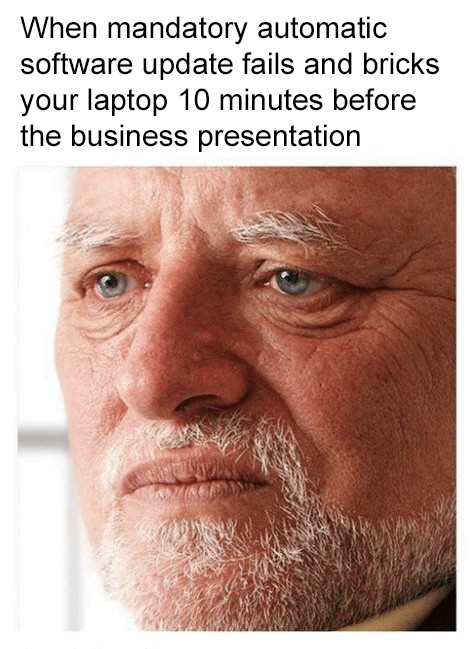
Is this the new "norm"?
So Where's the Outrage?
I've been observing how people used to react to various forms of DRM and their implementations overtime, and can say with fair certainty that people are getting used to DRM and are widely accepting these practices as a new norm.
For many of them, especially kids and teens, this is something they grew up with, and for them measures like the ones mentioned it this post are simply something to live with. They choose to put convenience above privacy and security, because unlike the former, the latter two can neither be seen, or heard, or tasted or felt.
Is this a bad thing? From a consumer perspective, absolutely. The more you rely on DRM-ridden devices and services, the greater the chance that in a few years:
- Your PC won't let you install new software unless it comes from an official app store
- Your smart home devices break and can't be repaired because they're glued together with epoxy, and you're forced to replace them all together because the latest version of the software doesn't support the previous product lineup
- Your smart TV refuses to play videos from a USB stick because it has an expired security certificate that can't be updated because the manufacturer doesn't support the older model
- And your electric car won't start until you apply an update since the company has decided to make all updates mandatory and the update produces an error that effectively locks you out of your personal vehicle
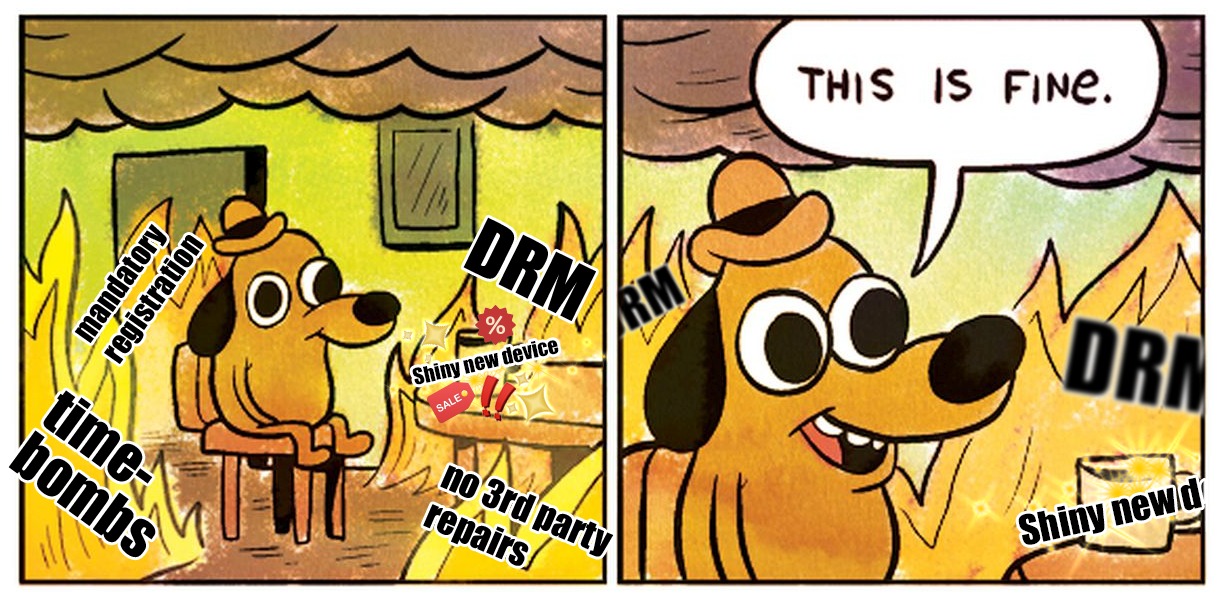
Naturally, I don't support such bullshit, so I avoid buying products that rely heavily on online DRM or are known to be difficult to repair. Does it make a difference for others? Of course not! For even though people will tell you that you should "lead by example", they fail to mention that statistically, you're heavily outnumbered by people who're just fine with the way things are as they don't consider this an issue in the slightest.
How to Deal With It
Like it or not, but the battle with DRM is lost. DRM is here to stay. And the consumers are OK with it.
On the other hand, YOU don't have to take it "as is" and still have control over your own actions and decisions. Which means you are the only person in your life who can truly take security and comfort of your own future into your own hands. So you could, for example:
- Spend some time researching the products carefully before making any costly purchase, especially if you're planning to use the product extensively and/or be able to repair it
- Look for alternatives if possible, in case a brand or a service you were used to "joined the dark side"
- Let your friends know that they should do the same (which they probably won't)
And ultimately you might find yourself some serviceable and reliable devices. It's not as easy as just buying "that most popular thing everyone loves so much", but it can end up being rewarding and hopefully, as more and more people follow such an approach, it might cause profit loss for DRM-happy companies and make them reconsider.
Talking about alternatives...
A Google Pixel phone, model 4a, a device produced by the corporation that's practically a synonym for the word "Internet" allowed me to set up my new smartphone without requiring me to connect to the Internet once. And then — to make use of all of its functions: take photos and videos, sideload and use apps e.t.c. All without forcing me to give my data away to some 3rd-party, Google included, before I had a chance to set up firewall rules to take control over what data the phone was broadcasting over the web.
This is something I have to commend Google for: in the times when even some of the smaller brands are pushing for mandatory user registration and online-only device set up, Google respects its users' decisions by giving them choice. In this particular case, at least.
Will they revise this and make setting up the phone via the Internet mandatory — only time will tell.
Just as the Internet of Things paradigm brings with it a lot of great tech and developments each day, so do all other things that come along for the ride: DRM, hardware lock-outs until registered/activated/verified and other objectively detrimental requirements people seem to take for granted as time goes on.
So… Just deal with it your own way.
"It's All Because of People Like You!"

I can see how after reading all of this your mind might immediately start looking for someone to blame, one who's not viscously fighting back. And it might as well be me. After all, I don't loudly virtue signal on Facebook, Twitter or other social media, and instead simply look after myself, deal with the situations at hand, help my friends do the same and share my concerns in a personal blog.
I just look at the facts and draw conclusions. And the facts are — most people don't care about the facts.
Not being a huge influencer, I also realize how little of an impact my actions would achieve if I were to try and convince people not to use all of those shiny products and services they've grown accustomed to (and fond of) over the years, because of some "privacy concerns" or "future-proofing" and instead will quickly become "that annoying paranoid guy" everyone avoids.
If you disagree, by all means, feel free to try and take action. And if you ever truly succeed in convincing people not to buy those popular goods and somehow let laws pass which would make it impossible for the companies and large corporations to make use of such practices for real and not on paper, do let me know and I will officially and publicly apologize for the error of my ways.
As for the bottom-line... I'm sorry, but this poster is just too perfect to not reference again, so I will stick it here as a grave reminder that you are the only one who can maintain true control over your own life, privacy and most importantly — choices and decisions.
